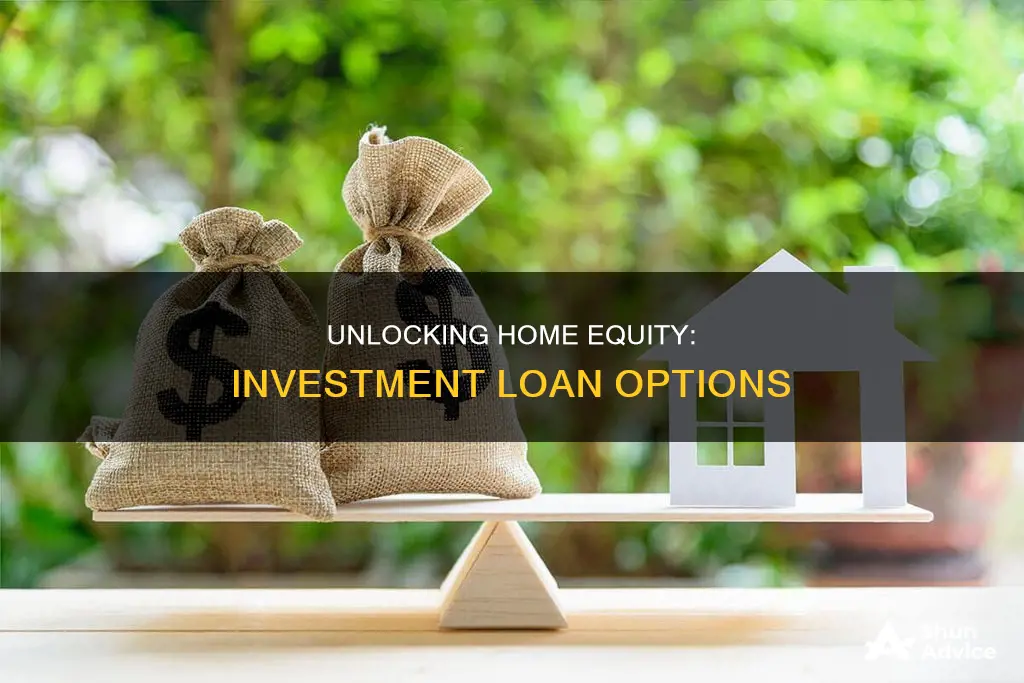
Home equity investment loans are a way for homeowners to access their home equity without increasing their debt or monthly payments. Homeowners can receive a lump-sum payment in exchange for selling a portion of their home's future value to an investor. This allows them to access cash quickly and use it for various purposes such as debt consolidation, home improvements, or unexpected expenses. However, it's important to consider the potential drawbacks, such as high fees and the investor taking a large portion of the home's appreciation.
| Characteristics | Values |
|---|---|
| Definition | A financial strategy that involves converting your existing home equity into cash. |
| Interest rate | No interest rate |
| Credit score requirements | More lenient requirements than traditional loans |
| Monthly payments | No monthly payments |
| Income requirements | No income requirements |
| Debt | Not considered debt |
| Investor's ownership stake | The investor won't hold any ownership stake and won't be added to the home's title |
| Buyout | You'll eventually buy out the investor's equity share with cash |
| Investor's share of depreciation | The investor shares in the depreciation of your home |
| Maximum amount | Up to $500k or $600k |
What You'll Learn

Home equity investment vs. home equity loan
Home equity investment and home equity loans are two different ways of borrowing money against the value of your property. Here are some of the key differences between the two:
Home Equity Investment (HEI)
An HEI is an agreement that allows you to sell a portion of your home's future value in exchange for a lump sum of cash today. This option is suitable for homeowners who need cash but cannot handle the monthly payments that come with a home equity loan or do not qualify for a HELOC due to a low credit score or inconsistent income. There are no monthly payments or interest charges associated with HEIs, and the credit and income standards are less stringent than with other loan options. The amount you receive can be as high as $600,000 and can be used for anything, including funding home improvements, consolidating debt, or investing in a business. However, there are some drawbacks to HEIs. The investor will take a share of your home's appreciation, which could result in you losing out on significant wealth if your property value increases substantially. Additionally, there are various upfront fees and closing costs associated with HEIs, and they may not be available in all states or for all property types.
Home Equity Loan
A home equity loan is a more traditional form of borrowing that allows you to take on debt secured by the equity in your home. With this option, you will typically need to meet strict credit score requirements and make monthly payments with interest. Home equity loans can provide a large sum of money, but you will need to make regular payments and manage the increased debt load. The qualification requirements for a home equity loan are generally more stringent than for an HEI, and you may need to meet minimum income thresholds. However, with a home equity loan, you retain full ownership of your home and do not need to share its future appreciation with an investor.
In summary, the main difference between HEIs and home equity loans lies in the repayment structure and the level of risk involved. HEIs offer more flexibility in terms of credit and income requirements and do not require monthly payments. However, you give up a portion of your home's future appreciation and may face significant costs if your property value increases. Home equity loans, on the other hand, follow a more traditional loan structure with regular payments and interest, but you retain full ownership and have more predictable costs. The best option for you will depend on your financial situation, goals, and risk tolerance.
Investment Managers: Economic Development's Unseen Architects
You may want to see also

Pros and cons of a home equity investment
A home equity investment is a strategy for turning your home equity into cash. It is an option for those who have low credit scores or inconsistent earnings.
Pros
- Lower credit score requirements than other equity products
- No monthly payments or interest costs
- No minimum income requirements
- Large lump sum of cash
- No restrictions on the use of funds
- Second properties may be eligible
Cons
- You may lose out on significant equity if your home increases in value
- Need a large share of equity to qualify
- Various upfront fees
- Longer application timeline
- Not available for all homeowners
- Sharing future appreciation
- Risk of foreclosure
- Unknown variables in terms of the true cost
Exploring Private Savings and Investment Spending Dynamics
You may want to see also

How does a home equity investment work?
A home equity investment is a strategy for turning your home's equity into cash. It is also called a home equity sharing agreement. This allows you to sell a portion of your home's future value in exchange for a lump-sum payment upfront.
Step 1: Prequalification and Application
First, you prequalify and then complete an online application. The company you're partnering with assesses your property's value and its potential for future appreciation. They consider your home's location, your equity position, and financial factors like your credit score, liens, and recent bankruptcies.
Step 2: Property Approval and Investment Amount
Once your property is approved, you agree on the investment amount. You receive a lump sum cash payment, and in return, you agree to share a portion of your home's future appreciation.
Step 3: Utilise the Benefits
You are now free to finance home improvements, consolidate debt, or make significant purchases.
Step 4: Repayment
You repay the initial investment amount, plus a share of the appreciation, when you decide to sell your home, when the term of the agreement comes to an end (typically 30 years), or at any other time you choose. If your home's value has decreased, some agreements ensure that the investment company shares in a portion of the loss.
Step 5: Buyback
You can buy back your equity at any time within the term, usually for a higher price. This depends on the investment company and the future appreciation they predict for the portion of your home equity they own.
Home equity investments are a creative way to turn your home's value into cash. They are particularly useful for those with low credit scores or inconsistent earnings who may not qualify for traditional loans. However, there are some drawbacks, including potentially losing out on significant wealth if your home's value increases substantially.
Managing Your Own Investment Portfolio: Is It Worth It?
You may want to see also

Who can qualify for a home equity investment?
Home equity investment is a good option for those with a low credit score or inconsistent income. In this scenario, you can sell a portion of your home's future value in exchange for a lump-sum payment. There are no monthly payments or interest charges; instead, you buy out the investor's equity share before the end of the term.
The qualification criteria for a home equity investment vary between companies. Here are some general criteria that you need to meet to qualify for a home equity investment:
- Credit score: While the credit score requirements are more lenient than with conventional lending, you still need to meet a minimum credit score requirement. This is typically around 500, but it can vary between companies.
- Home equity: You need to have sufficient equity in your home, usually at least 30% after the investment.
- Property type and location: The eligibility of your property depends on its type and location.
- Home value: Your home value needs to be above a certain threshold, typically $250,000.
- Debt-to-income ratio: Although there are no minimum income requirements, your debt-to-income ratio may be considered. A lower debt-to-income ratio, typically below 36%, is preferable.
It's important to note that the requirements may vary depending on the specific home equity investment company and the state in which you reside. Be sure to shop around and compare different companies' offers before making a decision.
Unlocking Home Equity: Is It Worth the Risk?
You may want to see also

Home equity investment example
Let's say you own a home worth $500,000, and you still owe $300,000 on your mortgage. This means you have $200,000 in home equity. You're looking to access some of this equity to pay off high-interest credit card debt and fund your small business.
You decide to explore a home equity investment (HEI) as a solution. You find a company, let's call it HEI Corp., that offers you $50,000 in exchange for 20% of your home's future value. Here's how the process might work:
- Prequalification and Application: You fill out a prequalification form on HEI Corp.'s website and provide information about your property, financial situation, and credit score. Based on this information, HEI Corp. determines that you meet their eligibility requirements and invites you to complete a full application.
- Property Appraisal and Offer: HEI Corp. sends a third-party appraiser to assess your property's current value and potential for future appreciation. They determine that your home is worth $500,000 and offer you $50,000 in cash in exchange for 20% of your home's future appreciation.
- Agreement and Closing: You accept the offer and proceed to close the deal. You cover the closing costs, which may include an origination fee, appraisal fee, and other third-party expenses.
- Receiving the Cash: After finalizing the agreement and paying the closing costs, you receive a lump-sum cash payment of $50,000 from HEI Corp. You are now free to use this money as you wish, such as paying off credit card debt and investing in your business.
- Enjoying the Benefits: Over the next few years, you successfully grow your business and improve your financial situation. You make no monthly payments to HEI Corp. and enjoy the improved cash flow.
- Repaying the Investment: After 10 years, you decide to sell your home. At this point, your home has appreciated and is worth $600,000. You repay HEI Corp. the initial investment of $50,000 plus their share of the appreciation, which is 20% of the $100,000 increase in value, resulting in a total repayment of $100,000.
In this example, you gained access to $50,000 in cash to achieve your financial goals without the burden of monthly payments. However, you repaid HEI Corp. $100,000, which is more than double the amount you initially received. This illustrates the potential benefit and cost of a home equity investment.
It's important to note that the specific numbers, terms, and processes may vary depending on your location, financial situation, and the investor you choose. Be sure to carefully review the offers, eligibility requirements, and potential costs before proceeding with a home equity investment.
Crafting a Cover Letter for Investment Management Roles
You may want to see also
Frequently asked questions
A home equity investment loan is a financial strategy that allows you to turn your home equity into cash. It is an alternative to traditional financing options, such as loans, that provides more flexibility and choices to achieve your financial goals.
With a home equity investment loan, you sell a portion of your home's future value in exchange for a lump-sum payment. There are no monthly payments or interest charges, and you will eventually buy out the investor's equity share with cash. The investor does not hold any ownership stake and is not added to the home's title.
Home equity investment loans offer several benefits, including no monthly payments, no interest costs, and less stringent credit and income requirements compared to traditional loans. They provide a way to access your home equity without increasing your debt load.







